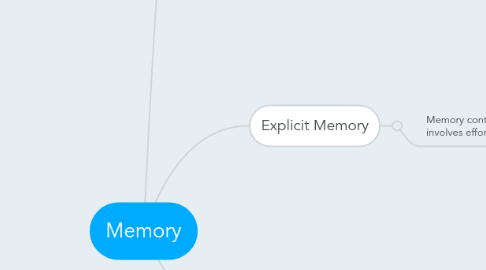
1. Explicit Memory
1.1. Memory controlled consciously, involves effort and intention
1.1.1. Working Memory
1.1.1.1. short term, limited info, used for mental calculations
1.1.1.1.1. 2-18 seconds
1.1.2. Episodic Memory
1.1.2.1. stores info on specific events, related in ones life
1.1.2.1.1. memory for associations with 2 stimuli
1.1.2.1.2. Ex. recalling what you ate for dinner the night before
1.1.3. Semantic Memory
1.1.3.1. long-term memory that stores ______
1.1.3.1.1. Ex. 2+2=4 (facts)
2. Implicit Memory
2.1. Memory that influences our current perceptions and behaviour without our knowledge
2.1.1. Priming
2.1.1.1. unnconscious process that enhances the speed/accuracy of a response
2.1.1.1.1. Ex. yellow and banana
2.1.2. Procedural Memory
2.1.2.1. memory of completing a task (automatic)
2.1.2.1.1. Ex. typing
2.1.3. Conditioning
2.1.3.1. A memory for associations formed between 2 stimuli
2.1.3.1.1. Ex. Pavlov's Dogs
3. Memory Stages
3.1. Sensory Memory
3.1.1. Memory that works for a brief period of time,
3.1.1.1. Iconic
3.1.1.1.1. memory for visual info
3.1.1.2. Echoic
3.1.1.2.1. memory for auditory info
3.1.1.3. gustic
3.1.1.3.1. memory for speech
3.1.1.4. olfactic
3.1.1.4.1. memory for smell
3.1.1.5. haptic
3.1.1.5.1. memory for touch
3.2. Working Memory
3.2.1. store/process info we are currently thinking about
3.2.1.1. Chunking
3.2.1.1.1. organization of items into units/chunks,
3.2.1.2. Serial Position Effect
3.2.1.2.1. depends on short term memory,
3.2.1.3. Primacy Effect
3.2.1.3.1. First items in a list more likely to be remebered long term
3.2.1.4. Recency Effect
3.2.1.4.1. concept that people tend to remember last items ona list first (working memory)
3.2.2. 7-2 items (passwords)
3.3. Long Term Memory
3.3.1. Encoding
3.3.1.1. shallow processing
3.3.1.1.1. physical features, rather than meaning
3.3.1.2. Deep processing
3.3.1.2.1. meaning of an item, involves new and old info
3.3.1.3. Massed Practice
3.3.1.3.1. Attempting to learn all in one sitting (cramming)
3.3.1.4. Spaced Practice
3.3.1.4.1. Repreated practice overtime
3.3.1.5. Self-Referent Encoding
3.3.1.5.1. Organizing material around your own lives
3.3.1.6. Distinctivness
3.3.1.6.1. Unique or distinct info is often remembered best
3.3.1.7. Organization
3.3.1.7.1. Organizing info helps memorization
3.3.1.8. Testing Effect
3.3.1.8.1. people who study and then are tested retain the info over long durations
3.3.2. Retrieval
3.3.2.1. Retroactive Intereference
3.3.2.1.1. new info blocks out older info
3.3.2.2. Proactive Interference
3.3.2.2.1. previously learned memories intrude with newer ones
3.3.2.3. State-Dependant Memory
3.3.2.3.1. Memory is best when emotional/physiological state is the same testing while learning
